
The god Apollo was a sun god
Apollo’s family ties
Apollo is a younger god, the son of Zeus and the nymph Leto, and the twin brother of Artemis.
Apollo’s sister Artemis
More Greek gods
All our Ancient Greece articles
The Greeks often thought of Apollo as being the same as Helios, the Sun god, or the same as the sun, and so he is one of the sky gods who always beat out the earth gods in Greek myths. Apollo’s younger brother is Hermes.
Apollo’s brother Hermes
Greek ideas about the sun
Apollo’s oracle at Delphi
Apollo does not marry or have many children, though sometimes he falls in love. Apollo is a wise god, the god of reason, logic, self-control and calm – like Spock in Star Trek. He can tell the future, and his temple at Delphi was a famous oracle, a place where people went to find out what was going to happen.
Apollo’s oracle at Delphi
What is an oracle?
Greek music and musicians
One of his sons is Asclepius, the god of medicine. Apollo is also a musician who plays the lyre.
What does Apollo look like?
Well, if you think of Apollo as the sun, then he looks like the sun. And of course he can take any shape he likes, because he’s a god. But when he takes human form, Apollo usually looks like a beautiful young man.

The god Apollo’s temple at Delphi, where people thought he predicted the future
Apollo defeats the Pythia
The Greeks told a story that when Apollo first came to Delphi there was a great snake living there, a sort of dragon, the Pythia.
Apollo killed the dragon and that was how Delphi became his temple. This story might come from a real historical truth that there was an earth goddess that people worshipped at Delphi before the Greeks came with their new god Apollo.
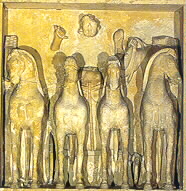
The god Apollo driving the chariot of the sun on a metope
What is it with stories about snakes and dragons?
This Greek story of Apollo defeating the dragon parallels the story of Medusa, where Athena defeats snakiness, or the story of how snakes attacked the baby Herakles.
Greek myth of Medusa
More about Herakles
Other cultures have the same kind of stories: check out the Ramayana, or Beowulf fighting Grendel. These stories represent the triumph of order over chaos.
Greek ideas of order and chaos
Stories of men defeating dragons and snakes also act as a metaphor for men defeating and dominating women, which in the mind of Greek men was the same thing as the triumph of order over chaos. Many of the stories about Apollo in Greek mythology are about the triumph of the god of reason, Apollo, over women and unreason – or just the domination of men over women.
Women in ancient Greece
Apollo in the Iliad
Right at the beginning of Homer’s Iliad, the Greeks have captured a Trojan woman, Chryseis, and Apollo wants them to return her. Apollo sends a plague to the Greek side, and in order to end the plague, Agamemnon, the Greek leader, does send Chryseis back to Troy.
Summary of the Iliad
Apollo and Cassandra

Cassandra dragged away from the altar (House of Menander, Pompeii, ca. 70 AD)
Another story about Apollo is the story of the Trojan priestess Cassandra. In this story, Apollo fell in love with Cassandra. He promised to give her the gift of prophecy if she would go out with him. She agreed, and he gave her the ability to know what would happen in the future.
More about Cassandra
But then Cassandra changed her mind and refused to go with him. Apollo refused to take no for an answer and spit in Cassandra’s mouth. Now she still had the gift of prophecy, but she was also cursed: she could tell the future, but nobody would ever believe her.
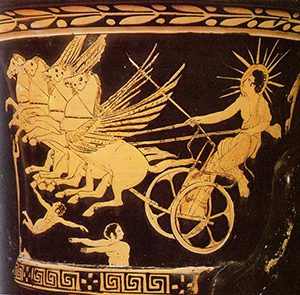
Phaethon drives Helios’ chariot
(This is a story about hubris, but also a story about Greek men’s idea that they had a right to Greek women’s bodies)
Apollo, Artemis, and Niobe
The story of Niobe is a second story from Greek mythology where Apollo punishes a woman for her hubris – for getting too uppity.
Read Niobe’s sad story

Apollo and Artemis kill Niobe’s children (Athens, 400s BC)
Niobe had seven children, and she unwisely boasted that she had more children than Apollo’s mother, Leto. So Leto sent Apollo and his sister Artemis to shoot all of Niobe’s children dead with their bows and arrows.
Helios and Phaethon
For another Apollo-related story about hubris, check out the story of Helios and Phaethon. Phaethon was the son of Helios with a mortal woman. He demanded to be allowed to drive his father’s chariot, the Chariot of the Sun. Helios reluctantly agreed, but Phaethon was not strong enough to drive the chariot properly, and caused all kinds of trouble.
Find out what happened to Phaethon
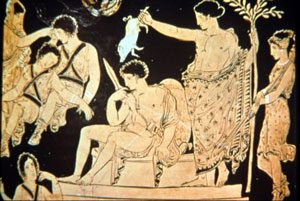
Orestes being purified by the god Apollo (Eumenides Painter, about 380 BC)
Apollo in Greek theater
In Greek plays, Apollo appears as the oracle who warns Oedipus of his fate, and he shows up to help Orestes at his trial. Apollo’s a god of justice and fairness and reason, so he’s a good choice for lawsuits.
More about Orestes
But here, what Orestes is on trial for is killing his mother, and what Apollo does is to get Orestes off, on the grounds that it was okay to kill his mother in order to avenge his father. So, once again, Apollo sides with men over women.
Learn by doing: act out one of these stories about the god Apollo
More about the oracle at Delphi
Bibliography and further reading about the Greek god Apollo:
D’aulaire’s Book of Greek Myths, by Edgar and Ingri D’Aulaire.
Greek Religion, by Walter Burkert (reprinted 1987). By a leading expert. He has sections on each of the Greek gods, and discusses their deeper meanings, and their function in Greek society.



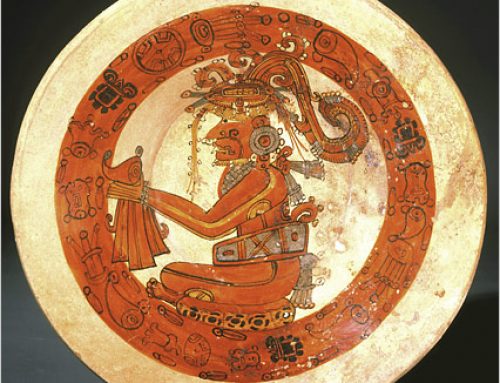

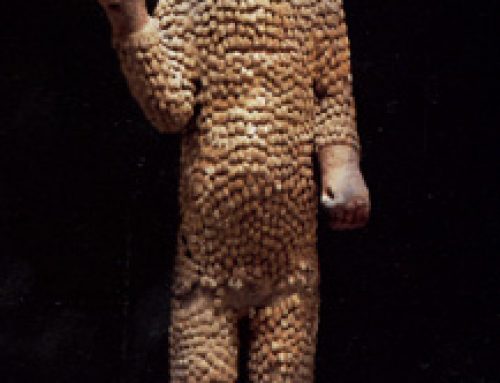
hu
mun
gus
8==D